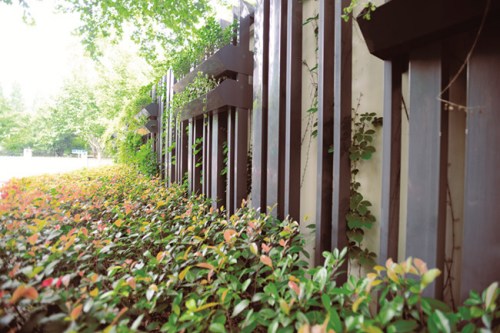A little sprucing up goes a long way on Wukang Road
 0 Comment(s)
0 Comment(s) Print
Print E-mail Shanghai Daily, June 10, 2015
E-mail Shanghai Daily, June 10, 2015
It was an average Monday morning on Wukang Road. A robust expatriate man was jogging along the street flanked with historical buildings. A slim Chinese woman was dropping her son off at the World Primary School, which was founded in 1936. Five young women in summer dresses in a rainbow of colors walked into a popular French bakery. Across the road, a uniformed middle-aged man was enjoying his dim sum while sitting on his old moped under the shade of a tree.
Everyone seemed to be passing through an ocean of history — a vivid past I want to reveal in this series about Wukang Road.
When I moved into a flat hidden down a lane on Wukang Road in 2009, a government project for regenerating this historical road was just coming to an end.
Stretching 1 kilometer, the road appeared more neat and beautiful, but it was still quiet and unknown. Often I had to explain where I lived by adding "not far from Xujiahui" or "near Huaihai Road."
But Wukang Road has miraculously become much more famous over the past five years. Xuhui District government set up a visitor center here, which has received over 220,000 domestic and overseas visitors. Chic restaurants and cafes have popped up on both sides of the street and are usually full of customers on weekends.
On sunny days, couples are seen posing for their wedding photos and models are also doing shoots. There are usually some tourists wondering around and looking at the old buildings.
In 2011, Wukang Road was named a national historical and cultural street by the State Administration of Cultural Heritage.
I don't have to explain where I live any more.
These changes can be attributed largely to the rejuvenation project that kicked off in 2007 — regarded as the city's first attempt to restore and revive a historical street. It proved to be so successful that Xuhui government plans to copy "the Wukang Road model" and apply to other historical streets.
According to the 1924 Chinese book "A Comprehensive View of Shanghai anecdotes," Wukang Road was originally built by a prominent American named John Calvin Ferguson. His goal was to make it convenient for faculty members to travel from downtown homes to Nanyang College (today's Shanghai Jiao Tong University). Locals often referred to this nameless road as Route de Ferguson.
The road is in the former "new French concession," a vast area that the French Municipal Council gained by expanding its concession westward to Huashan Road in 1914. It was the last time the concession expanded. The area was planned as a high-end residential zone to accommodate the city's growing population of wealthy individuals.
Still crisscrossed with farm fields, villages, graveyards and small rivers in the early 1900s, the neighborhood of Rue de Ferguson quickly grew to be an idyllic, convenient community graced by garden villas and apartment buildings during the 1920s and 1930s.
Experts at time referred to it as "the only well-planned, high-quality residential area in old Shanghai," where expatriate and Chinese merchants, politicians and celebrities had lived. The list of notable individuals who have lived on Wukang Road include silk tycoon Moh Shangqing, Kuomintang ministers Chen Lifu and Chen Guofu, Chairman Mao's second wife He Zizhen and renowned writer Ba Jin.
The road is also where world-famous architect I.M. Pei spent his childhood and where an article that triggered the "cultural revolution" (1966-76) was drafted.







